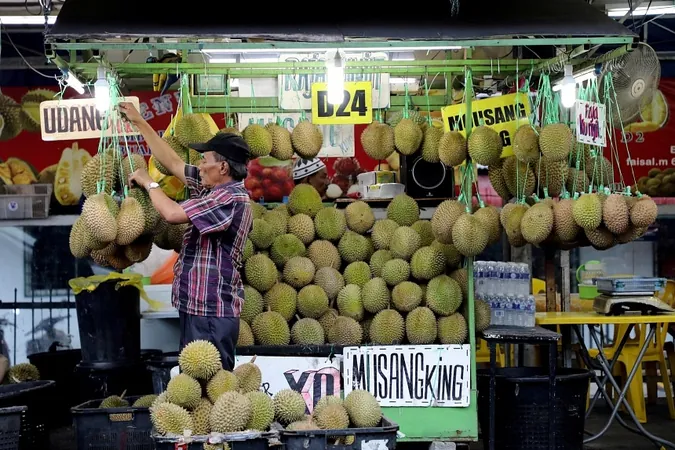
Musang King Durians Under Fire: Is Sweetness Sacrificing Authentic Flavor?
2024-09-17
Introduction
In a surprising development that has shaken the durian world, the esteemed Musang King variety is embroiled in a heated debate over its flavor profile. Known for its delectable blend of sweetness and subtle bitterness, farmers are now altering the iconic taste to cater to shifting consumer demands, particularly from markets like China.
Changing Flavor Profiles
Traditionally celebrated for its rich, golden flesh and robust flavor, the Musang King is experiencing manipulations to increase sweetness while diminishing its characteristic bitterness. This has alarmed durian purists who fear the fruit may lose its authentic taste.
Farmers' Allegations and Insights
An industry insider revealed that some farmers are actively working to enhance the sweetness of Musang King durians to better align with the preferences of consumers in the Chinese market. While some farmers vehemently deny these allegations, indicating they maintain the traditional taste, the evidence is hard to ignore.
Scientific Aspects of Flavor Alteration
Dr. Zulhazmi Sayuti from the Horticulture Research Centre of the Malaysian Agricultural Research and Development Institute noted that changes in fruit taste are scientifically feasible but come with undeniable challenges. He explains that compounds like saponins are responsible for the durian's bitterness, and modifying the genetic structure to reduce bitterness is complex yet possible. However, any genetic alterations come with strict regulations and ethical considerations in Malaysia, aimed at ensuring safety while promoting innovation in agriculture.
Influence of Tree Age
The age of the durian trees also plays a significant role in flavor. Younger trees, under 20 years old, tend to produce sweet fruit, while older trees yield fruit that is often more bitter. Regulatory bodies maintain a strict policy on genetically modified organisms, which means any attempts to alter the Musang King durian’s flavor must undergo rigorous testing.
Concerns from Industry Leaders
Furthermore, Anna Teo, the general secretary of the Durian Manufacturer Association, expressed concern over the dilution of flavor and aroma in today’s Musang King durians. She argued that, although advancements in farming methods allow for a certain degree of control over fruit quality, farmers should prioritize the fruit's integrity instead of merely focusing on its sweetness.
Preserving Tradition versus Market Preference
Lawrence Ting, president of the Federation of Malaysian Fruit Farmers Association, emphasized that cultivation practices, such as organic fertilization, are standard methods to enhance the natural flavors of durians while maintaining their unique characteristics. Malaysian durians are distinct in their flavor profile compared to Thailand's heavily sweet varieties, giving them an edge in authenticity.
Cultural Perspectives on Taste
Interestingly, first-time tasters from countries like China and Taiwan often misinterpret the Musang King's bitterness as a sign of spoilage, highlighting a cultural difference in taste preferences. Orchard owner Stephen Chow pointed out that for exporters, it’s essential to know which trees yield sweeter fruits. He affirmed that while there is a growing demand for specific attributes—like plump flesh and defined sections—no official request has been made to decrease bitterness.
Growing Demand and Market Expansion
The Federal Agricultural Marketing Authority (FAMA) has tirelessly worked to expand the market for Musang King durians, with Malaysian exports to China significantly increasing since frozen varieties were approved in 2011, followed by whole fresh durians starting August 2024.
Conclusion
As the Musang King stands at a crossroads between tradition and market demands, followers of this beloved fruit must ponder: Are we sacrificing the authentic taste of Musang King durians for the sake of sweetness? The debate continues, and the answer could reshape the future of Malaysia's durian industry.
 Brasil (PT)
Brasil (PT)
 Canada (EN)
Canada (EN)
 Chile (ES)
Chile (ES)
 España (ES)
España (ES)
 France (FR)
France (FR)
 Hong Kong (EN)
Hong Kong (EN)
 Italia (IT)
Italia (IT)
 日本 (JA)
日本 (JA)
 Magyarország (HU)
Magyarország (HU)
 Norge (NO)
Norge (NO)
 Polska (PL)
Polska (PL)
 Schweiz (DE)
Schweiz (DE)
 Singapore (EN)
Singapore (EN)
 Sverige (SV)
Sverige (SV)
 Suomi (FI)
Suomi (FI)
 Türkiye (TR)
Türkiye (TR)